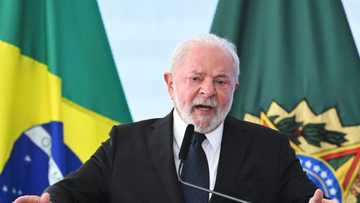China holds 'upper hand' in Russian gas exports

Source: AFP
PAY ATTENTION: See you at Legit.ng Media Literacy Webinar! Register for free now!
A massive new gas pipeline to China could help reduce Russia's reliance on European buyers, but analysts say the project reveals a growing imbalance between the longtime strategic allies.
Beijing emerged as an economic lifeline for Moscow last year, especially through energy purchases, after Western sanctions over Russia's invasion of Ukraine cut off crucial trade links.
Moscow is confident that the new pipeline -- Power of Siberia 2 -- is going ahead, but Beijing has so far avoided an explicit commitment.
Analysts say the lagging response shows an imbalance favouring Beijing in energy deals between the two countries -- as well as China's wariness of over-reliance on Russia for fuel.
China is "in no rush to sign anything unless the proposal is favourable and is shaped on China's terms," researcher Marina Shagina at the International Institute for Strategic Studies (IISS) in Berlin told AFP.
The project was discussed during Chinese President Xi Jinping's summit with Russian leader Vladimir Putin in Moscow this week.
PAY ATTENTION: Join Legit.ng Telegram channel! Never miss important updates!
Putin said after talks with Xi that "all agreements have been reached" on the Power of Siberia 2 project.
But their joint statement only said the two sides will work on pushing forward "research and consultation" on the pipeline.
The Chinese foreign ministry did not respond to a request for more details.
Power of Siberia 2 could facilitate the transport of 50 billion cubic metres of gas to China annually, roughly on par with the total capacity of the controversial Nord Stream 2 pipeline from Russia to Germany.
A senior Russian official suggested last year that it could strategically replace Nord Stream 2.
'Russia is desperate'
Previously the world's largest exporter of liquefied natural gas (LNG), Russia's gas exports plummeted in 2022 after a flurry of Western sanctions over the Ukraine war.
As Europe looked for other suppliers, Moscow turned to alternative buyers including China, with which it is already linked by the first Power of Siberia pipeline.
In 2022, China overtook Germany to become the top buyer of Russian energy. It has paid a total of $12.2 billion for coal, gas and oil from Russia so far this year, according to the Helsinki-based Centre for Research on Energy and Clean Air.
Russian gas deliveries to China through the existing Power of Siberia pipeline reached a record 15.5 billion cubic meters last year.
But sales to Asia pale in comparison with the 155 billion cubic metres of gas Russia exported to Europe prior to the Ukraine war.
"Russia is desperate to send as much gas as possible eastwards as Europe strives to reduce its dependence on Russian gas," said Philip Andrews-Speed, a senior research fellow at the National University of Singapore's Energy Studies Institute.
And a potential Power of Siberia 2 gas deal would consolidate China as a long-term market, said Jaime Concha, a gas market expert at industry analysis firm Energy Intelligence.
Russia's existing pipeline infrastructure "was mostly structured to cater to the European market", Concha told AFP.
Building up an equivalent network in Asia would be costly and time-consuming, he said, "which shows how few alternatives Russia has".
'Lessons from Europe'
China, meanwhile, has sought to ensure a diverse set of energy suppliers.
It has signed a flurry of long-term gas deals around the world in recent years, including a $60 billion, 27-year agreement with Qatar in November.
"Chinese policymakers also observe the lessons from Europe of overreliance on Russian energy imports," said Yan Qin, lead carbon analyst at Refinitiv.
With a strengthened position in energy negotiations with Russia, "China emerged as the winner from the war in Ukraine", IISS researcher Shagina told AFP.
"Beijing capitalised on Moscow's international isolation and ramped up its purchases of heavily discounted Russian oil, gas, and coal."
At the same time, China has felt the bite from the turmoil in global energy markets.
The war in Ukraine has pushed thermal coal prices at China's Qinhuangdao port "almost as high as Europe", Qin said, while rising LNG prices have hit gas power plants and industrial users.
Ultimately, she said, the Power of Siberia 2 pipeline could "enhance China's gas imports capacity greatly and potentially reduce China's LNG imports demand".
Source: AFP





